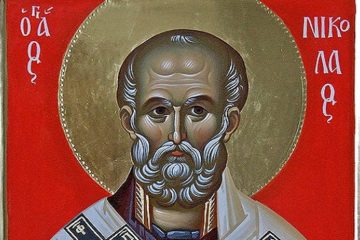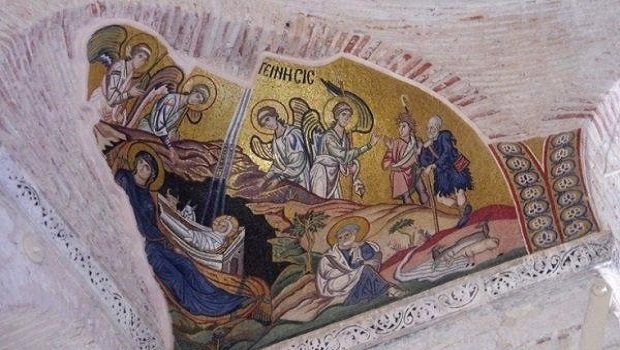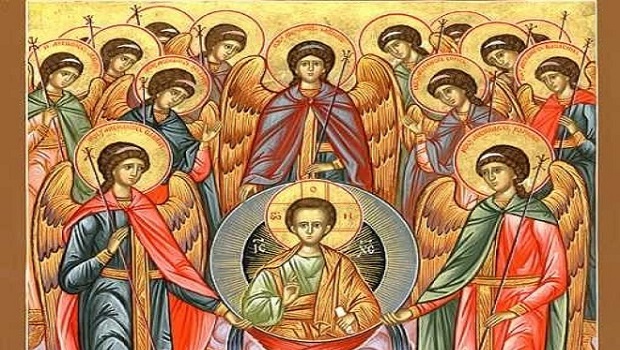Metropolitan of Pisidia Sotirios
Today we celebrate the “Synaxis of All the Saints of Pisidia, Side and Antalya, along with the “Holy Fathers of the Fourth Ecumenical Council of Chalkidon.
This common celebration was approved by the Holy Synod of our Ecumenical Patriarchate for two reasons: Firstly, because among the Fathers who took part in the Fourth Ecumenical Council, there were also several Bishops of the Metropolises of Pisidia, Side and Antalya. Secondly, because today, just as in previous days and those that follow, we celebrate the memory of over 15,000 Martyrs and various other Saints of our Greater Metropolitan District.
Our Church has established today’s reading to be taken from the last part of the Epistle sent by Apostle Paul to his Disciple Titus, whom he had placed as Bishop of Crete. One may wonder, why. Because in this passage, St. Paul advises the new Bishop to do what all other Bishops and Saints had applied in their lives, and whose memory we celebrate today: that is, love in action.
He writes to Titus: “Those who have believed in God should be careful to maintain good works. These things are good and profitable to men.” (verse 8).
In the preceding verses, the Apostle writes that our God has been compassionate to us and saved us through Holy Baptism, and by His Grace He blessed us to inherit eternal life (verses 5-6). That is why the faithful, who have so much benefited from God, must imitate Him and be beneficial to their fellow human beings. Not only should they themselves benefit others through their good works, but also, they should encourage others to play a leading part in good works.
That is, those who believe in Christ should not support the notion that only by believing in God is enough for us to be considered genuine Students of Christ. “Faith without works is dead” (James 2:20) writes St. James, Brother of the Lord. He also addresses anyone who thinks that he will be saved by faith alone, without good works: “Show me your faith without your works, I will show you my faith by my works” (James 2, 18) .
Let us, therefore, not turn a sympathetic ear to those who, by misinterpreting the meaning of the passages of the Holy Bible, argue that man can be saved by faith only. It is necessary for the Christian to confirm his faith in Christ with works pleasing to God; his faith ought to produce beneficial fruits. The believer’s main care should be charity.
Moreover, a Christian believer should not expect someone to knock on his door and ask for help; instead, he should seek himself to create opportunities to do good works. And he should also motivate others toward this direction. This way, not only does he benefit those whom he helps and shows compassion, but also those who do good works with him. For by doing so, he helps them also be rewarded by Christ in His Second Coming! (Matthew 25:34).
The Apostle Paul places no limits in his advice on good works. At the end of his Epistle to Bishop Titus, he urges him to make specific manifestations of love: “Send Zenas the lawyer and Apollos on their journey with haste, that they may lack nothing” (verse 13). And on the occasion of this preparation, by your exhortation and example, “let our people also learn to maintain good works, to meet urgent material needs, so that their lives may not be fruitless “(verse 14).
Not only does St. Paul, but also our Lord Jesus Christ compare Christians who lack works of love with fruitless trees. Let us remember the fig tree that had no fruit but leaves only and Jesus made it dry up (Matthew 21:19). Awakening are the words of the hymnographer: “Feering the sentence of the fruitless fig tree, brethren, let us bring forth fruits … to Christ” (Holy Monday Aposticha)
Dear Brothers and Sisters, let us understand this very well: The soul of the believer who lacks works of love and charity eventually becomes dried up. Even “faith without works is dead”, we heard Saint James saying. And those who will appear in front of “the terrible Seat of Christ” on Judgement Day with empty hands of works of love, Jesus has warned us that He will tell them: “Depart from me” (Matth. 25:41).
My beloved, may all of us, who today honor the memory of thousands of our Saints, imitate them, both in their faith and in the holiness of their lives as well as in their true love and good works, so that we may, too, be blessed to be with them around the heavenly throne of God’s grace. Amen.
Source: pemptousia.com




0 Comments